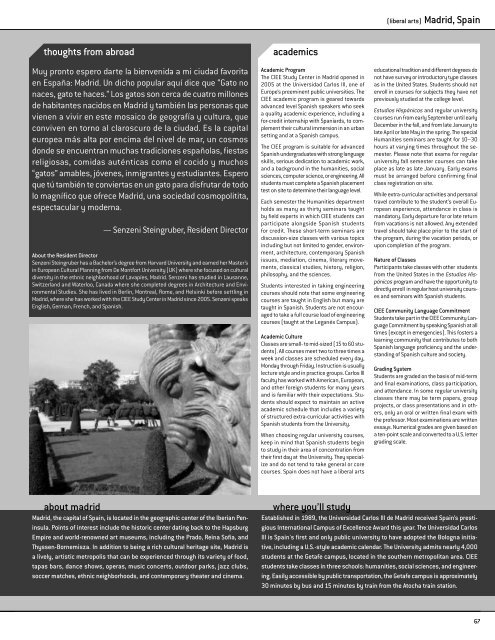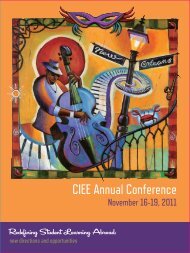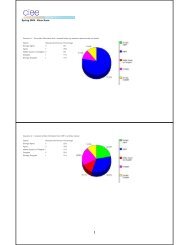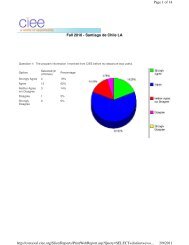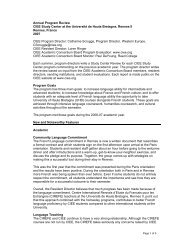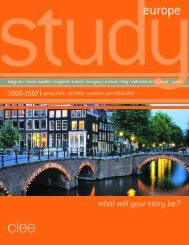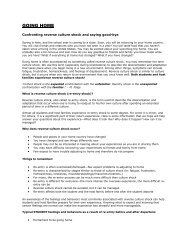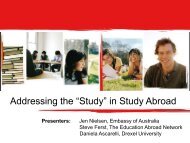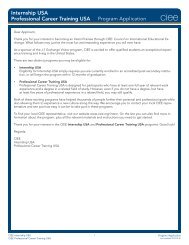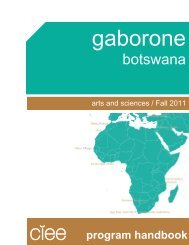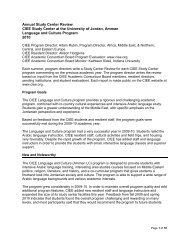study spain - Council on International Educational Exchange
study spain - Council on International Educational Exchange
study spain - Council on International Educational Exchange
You also want an ePaper? Increase the reach of your titles
YUMPU automatically turns print PDFs into web optimized ePapers that Google loves.
(liberal arts) Madrid, Spain<br />
thoughts from abroad<br />
Muy pr<strong>on</strong>to espero darte la bienvenida a mi ciudad favorita<br />
en España: Madrid. Un dicho popular aquí dice que “Gato no<br />
naces, gato te haces.” Los gatos s<strong>on</strong> cerca de cuatro mill<strong>on</strong>es<br />
de habitantes nacidos en Madrid y también las pers<strong>on</strong>as que<br />
vienen a vivir en este mosaico de geografía y cultura, que<br />
c<strong>on</strong>viven en torno al claroscuro de la ciudad. Es la capital<br />
europea más alta por encima del nivel de mar, un cosmos<br />
d<strong>on</strong>de se encuentran muchas tradici<strong>on</strong>es españolas, fiestas<br />
religiosas, comidas auténticas como el cocido y muchos<br />
“gatos” amables, jóvenes, inmigrantes y estudiantes. Espero<br />
que tú también te c<strong>on</strong>viertas en un gato para disfrutar de todo<br />
lo magnífico que ofrece Madrid, una sociedad cosmopolitita,<br />
espectacular y moderna.<br />
— Senzeni Steingruber, Resident Director<br />
About the Resident Director<br />
Senzeni Steingruber has a Bachelor’s degree from Harvard University and earned her Master’s<br />
in European Cultural Planning from De M<strong>on</strong>tfort University (UK) where she focused <strong>on</strong> cultural<br />
diversity in the ethnic neighborhood of Lavapíes, Madrid. Senzeni has studied in Lausanne,<br />
Switzerland and Waterloo, Canada where she completed degrees in Architecture and Envir<strong>on</strong>mental<br />
Studies. She has lived in Berlin, M<strong>on</strong>treal, Rome, and Helsinki before settling in<br />
Madrid, where she has worked with the CIEE Study Center in Madrid since 2005. Senzeni speaks<br />
English, German, French, and Spanish.<br />
academics<br />
Academic Program<br />
The CIEE Study Center in Madrid opened in<br />
2005 at the Universidad Carlos III, <strong>on</strong>e of<br />
Europe’s preeminent public universities. The<br />
CIEE academic program is geared towards<br />
advanced level Spanish speakers who seek<br />
a quality academic experience, including a<br />
for-credit internship with Spaniards, to complement<br />
their cultural immersi<strong>on</strong> in an urban<br />
setting and at a Spanish campus.<br />
The CIEE program is suitable for advanced<br />
Spanish undergraduates with str<strong>on</strong>g language<br />
skills, serious dedicati<strong>on</strong> to academic work,<br />
and a background in the humanities, social<br />
sciences, computer science, or engineering. All<br />
students must complete a Spanish placement<br />
test <strong>on</strong> site to determine their language level.<br />
Each semester the Humanities department<br />
holds as many as thirty seminars taught<br />
by field experts in which CIEE students can<br />
participate al<strong>on</strong>gside Spanish students<br />
for credit. These short-term seminars are<br />
discussi<strong>on</strong>-size classes with various topics<br />
including but not limited to gender, envir<strong>on</strong>ment,<br />
architecture, c<strong>on</strong>temporary Spanish<br />
issues, mediati<strong>on</strong>, cinema, literary movements,<br />
classical studies, history, religi<strong>on</strong>,<br />
philosophy, and the sciences.<br />
Students interested in taking engineering<br />
courses should note that some engineering<br />
courses are taught in English but many are<br />
taught in Spanish. Students are not encouraged<br />
to take a full course load of engineering<br />
courses (taught at the Leganés Campus).<br />
Academic Culture<br />
Classes are small- to mid-sized (15 to 60 students).<br />
All courses meet two to three times a<br />
week and classes are scheduled every day,<br />
M<strong>on</strong>day through Friday. Instructi<strong>on</strong> is usually<br />
lecture style and in practice groups. Carlos III<br />
faculty has worked with American, European,<br />
and other foreign students for many years<br />
and is familiar with their expectati<strong>on</strong>s. Students<br />
should expect to maintain an active<br />
academic schedule that includes a variety<br />
of structured extra-curricular activities with<br />
Spanish students from the University.<br />
When choosing regular university courses,<br />
keep in mind that Spanish students begin<br />
to <str<strong>on</strong>g>study</str<strong>on</strong>g> in their area of c<strong>on</strong>centrati<strong>on</strong> from<br />
their first day at the University. They specialize<br />
and do not tend to take general or core<br />
courses. Spain does not have a liberal arts<br />
educati<strong>on</strong>al traditi<strong>on</strong> and different degrees do<br />
not have survey or introductory type classes<br />
as in the United States. Students should not<br />
enroll in courses for subjects they have not<br />
previously studied at the college level.<br />
Estudios Hispánicos and regular university<br />
courses run from early September until early<br />
December in the fall, and from late January to<br />
late April or late May in the spring. The special<br />
Humanities seminars are taught for 10–30<br />
hours at varying times throughout the semester.<br />
Please note that exams for regular<br />
university fall semester courses can take<br />
place as late as late January. Early exams<br />
must be arranged before c<strong>on</strong>firming final<br />
class registrati<strong>on</strong> <strong>on</strong> site.<br />
While extra-curricular activities and pers<strong>on</strong>al<br />
travel c<strong>on</strong>tribute to the student’s overall European<br />
experience, attendance in class is<br />
mandatory. Early departure for or late return<br />
from vacati<strong>on</strong>s is not allowed. Any extended<br />
travel should take place prior to the start of<br />
the program, during the vacati<strong>on</strong> periods, or<br />
up<strong>on</strong> completi<strong>on</strong> of the program.<br />
Nature of Classes<br />
Participants take classes with other students<br />
from the United States in the Estudios Hispánicos<br />
program and have the opportunity to<br />
directly enroll in regular host university courses<br />
and seminars with Spanish students.<br />
CIEE Community Language Commitment<br />
Students take part in the CIEE Community Language<br />
Commitment by speaking Spanish at all<br />
times (except in emergencies). This fosters a<br />
learning community that c<strong>on</strong>tributes to both<br />
Spanish language proficiency and the understanding<br />
of Spanish culture and society.<br />
Grading System<br />
Students are graded <strong>on</strong> the basis of mid-term<br />
and final examinati<strong>on</strong>s, class participati<strong>on</strong>,<br />
and attendance. In some regular university<br />
classes there may be term papers, group<br />
projects, or class presentati<strong>on</strong>s and in others,<br />
<strong>on</strong>ly an oral or written final exam with<br />
the professor. Most examinati<strong>on</strong>s are written<br />
essays. Numerical grades are given based <strong>on</strong><br />
a ten-point scale and c<strong>on</strong>verted to a U.S. letter<br />
grading scale.<br />
about madrid<br />
where you’ll <str<strong>on</strong>g>study</str<strong>on</strong>g><br />
Madrid, the capital of • Modern, Spain, is wireless, located in green the geographic campus offering center of students the Iberian regular Peninsula.<br />
Points of interest which include they <str<strong>on</strong>g>study</str<strong>on</strong>g> historic al<strong>on</strong>gside center dating Spanish back students; to the Hapsburg tutors and gious c<strong>on</strong>versati<strong>on</strong> Internati<strong>on</strong>al Campus of Excellence Award this year. The Universidad Carlos<br />
University Established courses in 1989, the Universidad Carlos III de Madrid received Spain’s presti-<br />
Empire and world-renowned exchanges art available museums, including the Prado, Reina Sofia, and III is Spain's first and <strong>on</strong>ly public university to have adopted the Bologna initiative,<br />
orchestra including a U.S.-style academic calendar. The University admits nearly 4,000<br />
Thyssen-Bornemisza. • Many In additi<strong>on</strong> student to clubs, being from a rich theater cultural and heritage sports to site, dance, Madrid choir, is and<br />
a lively, artistic metropolis • Internships that in can the be local experienced community through according its to variety academic of food, major or students interest at the Getafe campus, located in the southern metropolitan area. CIEE<br />
tapas bars, dance • shows, Cultural operas, and educati<strong>on</strong>al music c<strong>on</strong>certs, activities outdoor such parks, as visits jazz to clubs, museums, students theaters, take and classes in three schools: humanities, social sciences, and engineering.<br />
Spain Easily accessible by public transportati<strong>on</strong>, the Getafe campus is approximately<br />
soccer matches, ethnic galleries; neighborhoods, excursi<strong>on</strong>s and to c<strong>on</strong>temporary sites of cultural theater importance and cinema.<br />
Madrid and<br />
30 minutes by bus and 15 minutes by train from the Atocha train stati<strong>on</strong>.<br />
67


